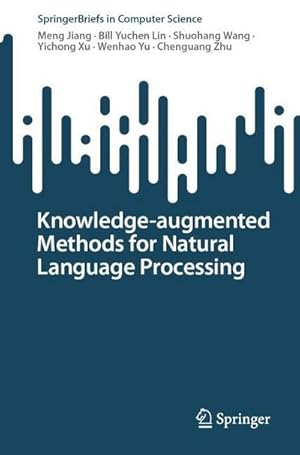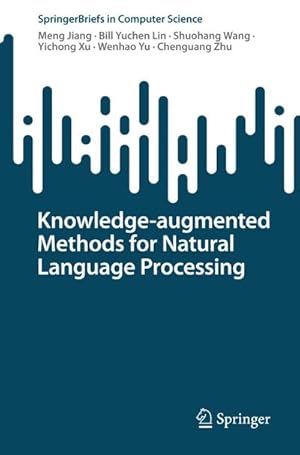knowledge augmented methods natural language di jiang meng (12 risultati)
Filtri di ricerca
Tipo di articolo
- Tutti i tipi di prodotto
- Libri (12)
- Riviste e Giornali (Nessun altro risultato corrispondente a questo perfezionamento)
- Fumetti (Nessun altro risultato corrispondente a questo perfezionamento)
- Spartiti (Nessun altro risultato corrispondente a questo perfezionamento)
- Arte, Stampe e Poster (Nessun altro risultato corrispondente a questo perfezionamento)
- Fotografie (Nessun altro risultato corrispondente a questo perfezionamento)
- Mappe (Nessun altro risultato corrispondente a questo perfezionamento)
- Manoscritti e Collezionismo cartaceo (Nessun altro risultato corrispondente a questo perfezionamento)
Condizioni Maggiori informazioni
- Nuovo (12)
- Come nuovo, Ottimo o Quasi ottimo (Nessun altro risultato corrispondente a questo perfezionamento)
- Molto buono o Buono (Nessun altro risultato corrispondente a questo perfezionamento)
- Discreto o Mediocre (Nessun altro risultato corrispondente a questo perfezionamento)
- Come descritto (Nessun altro risultato corrispondente a questo perfezionamento)
Legatura
- Tutte
- Rilegato (Nessun altro risultato corrispondente a questo perfezionamento)
- Brossura (12)
Ulteriori caratteristiche
- Prima ed. (Nessun altro risultato corrispondente a questo perfezionamento)
- Copia autograf. (Nessun altro risultato corrispondente a questo perfezionamento)
- Sovracoperta (Nessun altro risultato corrispondente a questo perfezionamento)
- Con foto (4)
- Non Print on Demand (8)
Lingua (1)
Prezzo
- Qualsiasi prezzo
- Inferiore a EUR 20 (Nessun altro risultato corrispondente a questo perfezionamento)
- EUR 20 a EUR 45
- Superiore a EUR 45
Spedizione gratuita
Paese del venditore
Valutazione venditore
-
Knowledge-augmented Methods for Natural Language Processing (SpringerBriefs in Computer Science)
Da: Best Price, Torrance, CA, U.S.A.
Condizione: New. SUPER FAST SHIPPING.
-
Knowledge-augmented Methods for Natural Language Processing (Paperback)
Editore: Springer Verlag, Singapore, 2024
ISBN 10: 9819707498 ISBN 13: 9789819707492
Lingua: Inglese
Da: Grand Eagle Retail, Bensenville, IL, U.S.A.
Paperback. Condizione: new. Paperback. Over the last few years, natural language processing has seen remarkable progress due to the emergence of larger-scale models, better training techniques, and greater availability of data. Examples of these advancements include GPT-4, ChatGPT, and other pre-trained language models. These models are capable of characterizing linguistic patterns and generating context-aware representations, resulting in high-quality output. However, these models rely solely on input-output pairs during training and, therefore, struggle to incorporate external world knowledge, such as named entities, their relations, common sense, and domain-specific content. Incorporating knowledge into the training and inference of language models is critical to their ability to represent language accurately. Additionally, knowledge is essential in achieving higher levels of intelligence that cannot be attained through statistical learning of input text patterns alone. In this book, we will review recent developmentsin the field of natural language processing, specifically focusing on the role of knowledge in language representation. We will examine how pre-trained language models like GPT-4 and ChatGPT are limited in their ability to capture external world knowledge and explore various approaches to incorporate knowledge into language models. Additionally, we will discuss the significance of knowledge in enabling higher levels of intelligence that go beyond statistical learning on input text patterns. Overall, this survey aims to provide insights into the importance of knowledge in natural language processing and highlight recent advances in this field. We will examine how pre-trained language models like GPT-4 and ChatGPT are limited in their ability to capture external world knowledge and explore various approaches to incorporate knowledge into language models. Shipping may be from multiple locations in the US or from the UK, depending on stock availability.
-
Condizione: New. 2024th edition NO-PA16APR2015-KAP.
-
Knowledge-augmented Methods for Natural Language Processing
Editore: Springer-Nature New York Inc, 2024
ISBN 10: 9819707498 ISBN 13: 9789819707492
Lingua: Inglese
Da: Revaluation Books, Exeter, Regno Unito
EUR 69,21
EUR 11,35 per la spedizione da Regno Unito a U.S.A.Quantità: 2 disponibili
Aggiungi al carrelloPaperback. Condizione: Brand New. 104 pages. 9.25x6.10x9.25 inches. In Stock.
-
Knowledge-augmented Methods for Natural Language Processing
Editore: Springer Nature Singapore, Springer Nature Singapore Mai 2024, 2024
ISBN 10: 9819707498 ISBN 13: 9789819707492
Lingua: Inglese
Da: buchversandmimpf2000, Emtmannsberg, BAYE, Germania
EUR 48,14
EUR 60,00 per la spedizione da Germania a U.S.A.Quantità: 2 disponibili
Aggiungi al carrelloTaschenbuch. Condizione: Neu. Neuware -Over the last few years, natural language processing has seen remarkable progress due to the emergence of larger-scale models, better training techniques, and greater availability of data. Examples of these advancements include GPT-4, ChatGPT, and other pre-trained language models. These models are capable of characterizing linguistic patterns and generating context-aware representations, resulting in high-quality output. However, these models rely solely on input-output pairs during training and, therefore, struggle to incorporate external world knowledge, such as named entities, their relations, common sense, and domain-specific content. Incorporating knowledge into the training and inference of language models is critical to their ability to represent language accurately. Additionally, knowledge is essential in achieving higher levels of intelligence that cannot be attained through statistical learning of input text patterns alone. In this book, we will review recent developmentsin the field of natural language processing, specifically focusing on the role of knowledge in language representation. We will examine how pre-trained language models like GPT-4 and ChatGPT are limited in their ability to capture external world knowledge and explore various approaches to incorporate knowledge into language models. Additionally, we will discuss the significance of knowledge in enabling higher levels of intelligence that go beyond statistical learning on input text patterns. Overall, this survey aims to provide insights into the importance of knowledge in natural language processing and highlight recent advances in this field.Springer Verlag GmbH, Tiergartenstr. 17, 69121 Heidelberg 108 pp. Englisch.
-
Knowledge-augmented Methods for Natural Language Processing
Editore: Springer Nature Singapore, Springer Nature Singapore, 2024
ISBN 10: 9819707498 ISBN 13: 9789819707492
Lingua: Inglese
Da: AHA-BUCH GmbH, Einbeck, Germania
EUR 51,69
EUR 60,89 per la spedizione da Germania a U.S.A.Quantità: 1 disponibili
Aggiungi al carrelloTaschenbuch. Condizione: Neu. Druck auf Anfrage Neuware - Printed after ordering - Over the last few years, natural language processing has seen remarkable progress due to the emergence of larger-scale models, better training techniques, and greater availability of data. Examples of these advancements include GPT-4, ChatGPT, and other pre-trained language models. These models are capable of characterizing linguistic patterns and generating context-aware representations, resulting in high-quality output. However, these models rely solely on input-output pairs during training and, therefore, struggle to incorporate external world knowledge, such as named entities, their relations, common sense, and domain-specific content. Incorporating knowledge into the training and inference of language models is critical to their ability to represent language accurately. Additionally, knowledge is essential in achieving higher levels of intelligence that cannot be attained through statistical learning of input text patterns alone. In this book, we will review recent developmentsin the field of natural language processing, specifically focusing on the role of knowledge in language representation. We will examine how pre-trained language models like GPT-4 and ChatGPT are limited in their ability to capture external world knowledge and explore various approaches to incorporate knowledge into language models. Additionally, we will discuss the significance of knowledge in enabling higher levels of intelligence that go beyond statistical learning on input text patterns. Overall, this survey aims to provide insights into the importance of knowledge in natural language processing and highlight recent advances in this field.
-
Knowledge-augmented Methods for Natural Language Processing (Paperback)
Editore: Springer Verlag, Singapore, 2024
ISBN 10: 9819707498 ISBN 13: 9789819707492
Lingua: Inglese
Da: AussieBookSeller, Truganina, VIC, Australia
EUR 84,62
EUR 31,93 per la spedizione da Australia a U.S.A.Quantità: 1 disponibili
Aggiungi al carrelloPaperback. Condizione: new. Paperback. Over the last few years, natural language processing has seen remarkable progress due to the emergence of larger-scale models, better training techniques, and greater availability of data. Examples of these advancements include GPT-4, ChatGPT, and other pre-trained language models. These models are capable of characterizing linguistic patterns and generating context-aware representations, resulting in high-quality output. However, these models rely solely on input-output pairs during training and, therefore, struggle to incorporate external world knowledge, such as named entities, their relations, common sense, and domain-specific content. Incorporating knowledge into the training and inference of language models is critical to their ability to represent language accurately. Additionally, knowledge is essential in achieving higher levels of intelligence that cannot be attained through statistical learning of input text patterns alone. In this book, we will review recent developmentsin the field of natural language processing, specifically focusing on the role of knowledge in language representation. We will examine how pre-trained language models like GPT-4 and ChatGPT are limited in their ability to capture external world knowledge and explore various approaches to incorporate knowledge into language models. Additionally, we will discuss the significance of knowledge in enabling higher levels of intelligence that go beyond statistical learning on input text patterns. Overall, this survey aims to provide insights into the importance of knowledge in natural language processing and highlight recent advances in this field. We will examine how pre-trained language models like GPT-4 and ChatGPT are limited in their ability to capture external world knowledge and explore various approaches to incorporate knowledge into language models. Shipping may be from our Sydney, NSW warehouse or from our UK or US warehouse, depending on stock availability.
-
EUR 45,80
EUR 70,00 per la spedizione da Germania a U.S.A.Quantità: 5 disponibili
Aggiungi al carrelloTaschenbuch. Condizione: Neu. Knowledge-augmented Methods for Natural Language Processing | Meng Jiang (u. a.) | Taschenbuch | ix | Englisch | 2024 | Springer Singapore | EAN 9789819707492 | Verantwortliche Person für die EU: Springer Verlag GmbH, Tiergartenstr. 17, 69121 Heidelberg, juergen[dot]hartmann[at]springer[dot]com | Anbieter: preigu.
-
Knowledge-augmented Methods for Natural Language Processing
Editore: Springer Verlag Gmbh Mai 2024, 2024
ISBN 10: 9819707498 ISBN 13: 9789819707492
Lingua: Inglese
Da: BuchWeltWeit Ludwig Meier e.K., Bergisch Gladbach, Germania
EUR 48,14
EUR 23,00 per la spedizione da Germania a U.S.A.Quantità: 2 disponibili
Aggiungi al carrelloTaschenbuch. Condizione: Neu. This item is printed on demand - it takes 3-4 days longer - Neuware Englisch.
-
Knowledge-augmented Methods for Natural Language Processing
Da: Majestic Books, Hounslow, Regno Unito
EUR 70,64
EUR 7,38 per la spedizione da Regno Unito a U.S.A.Quantità: 4 disponibili
Aggiungi al carrelloCondizione: New. Print on Demand.
-
Knowledge-augmented Methods for Natural Language Processing
Da: Biblios, Frankfurt am main, HESSE, Germania
EUR 71,66
EUR 9,95 per la spedizione da Germania a U.S.A.Quantità: 4 disponibili
Aggiungi al carrelloCondizione: New. PRINT ON DEMAND.
-
Knowledge-augmented Methods for Natural Language Processing
Editore: Springer, Berlin|Springer Nature Singapore|Springer, 2024
ISBN 10: 9819707498 ISBN 13: 9789819707492
Lingua: Inglese
Da: moluna, Greven, Germania
EUR 43,98
EUR 48,99 per la spedizione da Germania a U.S.A.Quantità: Più di 20 disponibili
Aggiungi al carrelloCondizione: New. Dieser Artikel ist ein Print on Demand Artikel und wird nach Ihrer Bestellung fuer Sie gedruckt. Over the last few years, natural language processing has seen remarkable progress due to the emergence of larger-scale models, better training techniques, and greater availability of data. Examples of these advancements include GPT-4, ChatGPT, and other .






